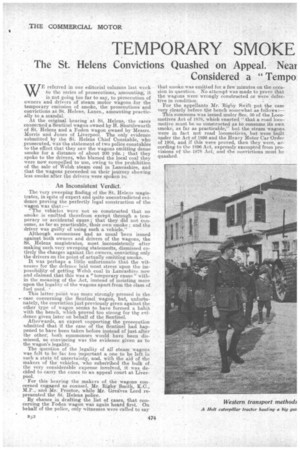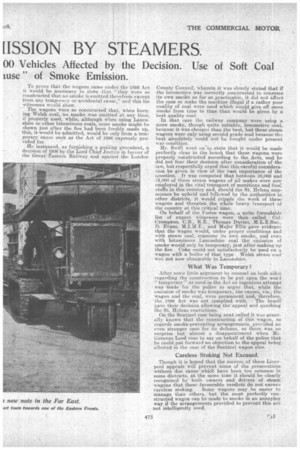TEMPORARY SMOKE FISSION BY STEAMERS.
Page 12

Page 13

If you've noticed an error in this article please click here to report it so we can fix it.
WE referred in our editorial columns last week to the series ofprosecutions, amounting; it is not going too far to say, to persecution of owners and drivers of steam motor wagons for the temporary emission of smoke, the prosecutions and convictions at St. Helens, Lancs., amounting practically to a scandal. At the original hearing at St. Helens, the eases concerned a Sentinel wagon owned by H. Shuttleworth of St. Helens and a Foden wagon owned by Messrs. Morris and Jones of Liverpool. The only evidence submitted by the St. Helens Chief Constable, who prosecuted, wns the statement of two police constables to the effect that they saw the wagons emitting dense smoke for a distance of about 200 yds. ; that they spoke to the drivers, who blamed the local coal they were now compelled to use, owing to the prohibition of the sale of Welsh steam coal in Lancashire, and that the wagons proceeded on their journey showing less smoke after the drivers avere spoken to.
An Inconsistent Verdict.
The very sweeping finding of the St. Helens magistrates, in spite of expert and quite uncontradicted evidence proving the perfectly legal construction of the • wagon was that :— ' The vehicles were not so constructed that no smoke is emitted therefrom except through a temporary or accidental cause ; that they did not consume, as far as practicable, their own smoke ; and the driver was guilty of 'using such a vehicle." Although summonses had as usual been issued against both owners and drivers of the wagons, the St.. Helens magistrates, most inconsistently after making such, very sweeping statements, dismissed entirely the charges against the owners, convicting only the drivers on the point of actually emitting smoke. It was perhaps a little unfortunate that the witnesses for the defence laid most stress upon the impossibility of getting Welsh coal in Lancashire now and claimed that this was a "temporary ca-use" within the meaning of the Act, instead of insisting more upon the legality of the wagons apart from the class of fuel used. • _ , This latter point was more strongly pressed in the case concerning the Sentinel wagon, but, unfortunately, the conviction just previously given against the other type of wagon seems to have formed a habit with the bench, which proved too strong for tiv evidence given later on behalf of the Sentinel.
Afterwards, an expert supporting the prosecution admitted that if the case of the Sentinel had happened to have been taken before instead of just after the other; both summonses would have been dismissed, so convincing was the evidence given as to the wagon's legality. The question of the legality of all steam wagons was felt to be far too important a one to be left in sucha state of uncertainty, •and, with the aid of the Makers of the vehicles, who subsCribed the bulk of the very considerable expense involved, it was decided to carry the cases to an appeal court at Liver
pool. .
"For this hearing the makers of the wagons concerned engaged as counsel, Mr. Riglay Smith, K.C., m.p., and Mr. Proctor, while Mr, area:yes Lord represented the St. Helens police. By chance in drafting the list of cases, that concerning the Fode,n wagon was again heard first. On behalf of the police, only witnesses were called to say
that smoke was emitted for a few minutes on the occasion in question. No attempt was made to prove that the wagons were wrongly constructed or were defective in condition.
• For the appellants Mr. Rigby Swift put the case very clearly before the bench somewhat as follows :-
This summons was issued under Sec. 30 of the Locomotives Act of 1878, which enacted " that a road locomotive must be so constructed as to consume its own smoke, as far as practicable," but the steam wagons were in fact not road locomotives, but were built under the Act of 1896 and the Heavy Motor Car Order of 1904, and if this were proved, then they were, according to the 1896 Act, expressly exempted from provisions of -the 1878 Act, and the convictions must be quashed.
To prove that the wagons came under the 1896 Act it would be necessary to show that " they were so constructed that no smoke is emitted therefrom except from any temporary or accidental cause," and this his witnesses would show.
The wagons were so constructed that, when burning Welsh coal, no smoke was emitted at any time, if properly used, while, although when using Lancashire or other bituminous coils, some. smoke might be shown just after the fire had been freshly made up, this, it would be admitted, would be only from a temporary cause such as the Act of 1896 expressly provided for.
He instanced, as furnishing a guiding precedent, a decision of 1906 by the Lord Chief Just'Lee in favour of the Great rastern Railway and against the London County Council, wherein it was clearly stated that if the locomotive was correctly constructed to consume its own smoke as far as practicable, it did not affect the case or make the machine illegal if a rather poor quality of coal were used which would give off more smoke from time to time than would be given by a best quality coal. . In that ease the railway company were using a more smoky, though quite suitable, locomotive coal, because it was cheaper than the best, but these steam wagons were only using second grade coal because, the best absolutely could not be bought under present war condition.
Mr. Swift went on to state that it would be made perfectly clear to the bench that these wagons were properly constructed according to the Acts, and he did not fear their decision after consideration of the law, but respectfully urged that this -careful consideration be given in view of the vast importance of the question. It was computed that between 10,000 and i2,000 of these steam wagons of all makes were now employed in the vital transport of munitions and feta; stuffs in this country and should the St. Helens summonses be upheld and followed by the authorities in other districts, it would cripple the work of these wagons and. threaten the whole heavy transport of the country at this critical time.
On behalf of the Foden wagon, a quite formidable list of expert Witnesses were then called. Col. Crompton. C.B. R.E., •Thornas Davies, M.L.E.Soc., D. Evans, and Mayor Ellis gave evidence that the wagon would, under proper conditions and with steam coal, consume its own smoke,. and even with bituminous Lancashire coal the emission of smoke would only be temporary, just after making up the fire. Coke could not satisfactorily be used on a wagon with a boiler of that type Welsh steam coal was not now obtainable in Lancashire.
What Was Temporary ?
After some little argument by counsel on both sides regarding the construction to be put upon the word " teinporary " as used in the Act an ingenious attempt was made for the police to argue that, while the emission of smoke was temporary, the' causes, viz.„ thc wagon and the oal, were permanent and, therefore, the 1896 Act was not complied with. The bench' gave their decision allowing the appeal and quashing the St. Helens convictions.
. On the Sentinel case being next called it was generally known that the construction of this wagon, as • regards smoke-preventing arrangements, provided an even stronger case for its defence, so there was no surprise but almost a disappointment when Mr. Greaves Lord rose to say on behalf of the police that he could put forward no objection to the appeal being allowed in the ease of the Sentinel wagon also.
Careless Stoking Not Excused.
Though it is hoped that the success of these Liverpool appeals will prevent some of the prosecutions without due cause which have been too common in some districts, at the same time it should be clearly recognized by both owners and drivers of steam wagons that these favourable verdicts do not excuse careless stoking. Some wagons may be easier to manage than others, but the most In con structed wagon can be made to smoke in an annoying way if the arrangements provided to prevent this are not intelligently used.






















